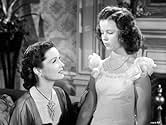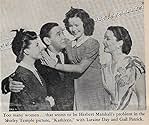Ajouter une intrigue dans votre langueKathleen is a 12 year old who lives in a big house with a nanny, a butler, maids, no mother and a father who is working most of the time. She dreams of a family with a mother, father and her... Tout lireKathleen is a 12 year old who lives in a big house with a nanny, a butler, maids, no mother and a father who is working most of the time. She dreams of a family with a mother, father and her, and tells everyone that she has such a family. Because of this story, she cannot invite ... Tout lireKathleen is a 12 year old who lives in a big house with a nanny, a butler, maids, no mother and a father who is working most of the time. She dreams of a family with a mother, father and her, and tells everyone that she has such a family. Because of this story, she cannot invite any friends over as they will see that it is not true. Kathleen and her nanny, Mrs. Farrel... Tout lire
- Réalisation
- Scénario
- Casting principal
- Récompenses
- 2 victoires au total
- Miss Bewley
- (scènes coupées)
- Woman Customer at Shoner's Store
- (non crédité)
Avis à la une
All child actors must eventually face uncertainty when they outgrow the young roles that made them successful. Shirley Temple was beyond successful as a child actress, capturing the hearts of moviegoers for years. When she became too old for the "Good Ship Lollipop", would she be able to transition successfully into teen roles and adult roles?
In 'Kathleen", Shirley is 13 years old. The drama of this film is similar to dramatic scenes she had previously played as a child, but viewers expect more from older performers. In "Kathleen" she portrays angst and outrage, but her performance is too childlike, which impacts the early scenes especially. In a few years, she would be better equipped to emote with greater depth. In 1947's "That Hagen Girl", for example, she adeptly portrays a troubled teen beset with a haunting past who is the target of an entire town. 1949's "A Kiss for Corliss" (A comedy with David Niven) is effectively the end of her film career, so she used her newfound skills only sparingly.
Watch for Laraine Day and Gail Patrick, who face off over Kathleen's well-being and the girl's father, played by Herbert Marshall. All of them acquit themselves well. Day, remarkably, is only 8 years old than Shirley, but convincingly plays a professional woman who possesses authority and confidence.
One final note: this film was released soon after the attack on Pearl Harbor. I can only wonder what effect that had on attendance and the public's willingness to be entertained. The nation was in shock and dealing with important matters that completely altered its way of life. A determined response to aggression, and fears about worldwide aggression, were paramount. Still, the nation would learn to use cinema to channel its patriotic fervor and, conversely, to escape harsh realities.
While Shirley herself is charming and poised as the unhappy girl, the script is a dreary thing with no one able to overcome the inadequacies of the slim story. Laraine Day is her usual charming self, Marshall is stuffy and aloof as Shirley's father and Gail Patrick has a totally unsympathetic role as "the other woman" eager to get her clutches on a rich husband.
A musical sequence showing Shirley lending her voice to a dismal song is clearly dubbed and seems to belong to another picture, it's so out of whack with the rest of the film.
Clearly disappointing and only interesting to see Temple as a maturing 12-year old and given some nice glossy MGM close-ups. Some good moments, but not enough and apparently MGM decided not to release this one to video, at least not as of this writing.
Shirley Temple is having trouble growing into her terrible teens. It's a tough thing to have an icon change in front of your eyes. That's the difficulty faced by an audience of her era. She's also stuck using the same acting tricks that had worked so well as a child actor. While it looks cute as a child, it looks like sentimental cloying as she gets older. I do have an issue with the dream dance sequence with full grown men. It has different meaning as she grows into a young woman. The other big issue is the lack of chemistry between the father and Dr. Kent. It's not enough for Lorraine to be a sneaky gold-digger. This has all the ingredients but the mixture is barely passable.
"Kathleen" is an odd film. It isn't bad, but along with other films like "The Blue Bird", it managed to alienate the public from Temple because the films were such a departure from the sweet Temple films of the 1930s. Part of this, of course, is because Shirley was older and the old style films wouldn't have worked as well with a child about to become a teen. Part of it, however, is that the studios didn't really seem to know what to do with her.
I liked the Kathleen character. Her manipulative personality was pretty funny and I liked some of her bratty moments. However, what I didn't like about her were the fantasy scenes. These involved musical interludes that just weren't necessary and really slowed down the film. In fact, had they cut them all out, the movie would have worked much better--especially since music seemed inappropriate to this style of film. Plus, while Shirley was great singing as a child, here she seems a bit out of her element in these production numbers.
So is it worth seeing? Sure. The negatives about this one are far outweighed by the good. Shirley's performance is very nice and the story quite clever. And, although the ending was a bit sticky, I did like it. A very different sort of film for the actress, that's for sure--but a nice one. But also it's so different that I could easily see folks disliking it.
Le saviez-vous
- AnecdotesA body double for Herbert Marshall was used in the scene where his character runs past Shirley Temple and up the stairs after Mrs. Farrell opens the box containing a firecracker. Marshall lost a leg in WWI and body doubles were always used whenever his character had to run or walk quickly up staircases.
- Citations
Mrs. Farrell: If you were a nice girl with a nice clean mind, you wouldn't keep a diary.
Kathleen Davis: You peeping Tom!
- ConnexionsReferenced in We Must Have Music (1941)
- Bandes originalesAround the Corner
(1941)
Music and lyrics by Roger Edens and Earl K. Brent (as Earl Brent)
Played during the opening and closing credits
Played on a music box several times
Sung by Shirley Temple (uncredited) and chorus in a musical review during her daydream
Played as background music often
Meilleurs choix
Détails
- Durée
- 1h 28min(88 min)
- Couleur
- Rapport de forme
- 1.37 : 1



























